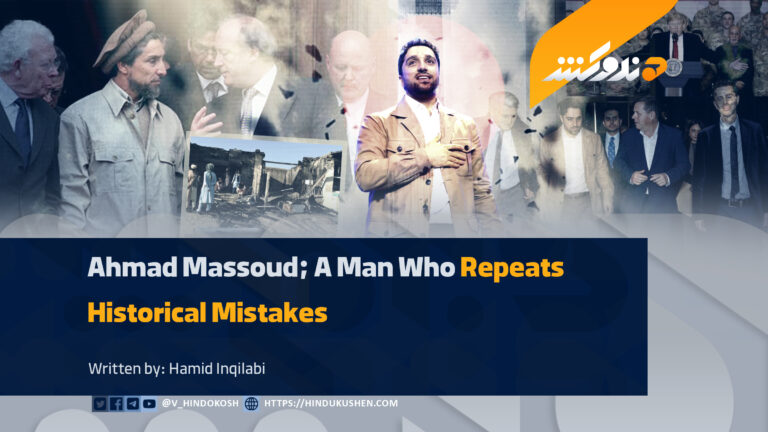Written by: Hamid Inqilabi
Ahmad Massoud, the leader of the National Resistance Front, gave an interview during his recent trip to France. In this interview, Massoud’s irresponsible statements sparked debate among analysts, activists, and the public. In this interview, Masoud stated that there are twenty irresponsible armed groups active in Afghanistan whose activities have increased severalfold in Pakistan and even been seen in France. He also said that the Afghan government supports these groups, and for this reason, Pakistan attacked Afghanistan. The concerning point is that after a long silence, Massoud not only did not condemn Pakistan’s attack, but he also called it the right and defense of that country. These statements can be considered a form of lobbying and political flattery to legitimize Pakistan’s attacks, as justifying the military aggression of another country for someone who calls himself the leader of a political party calls into question the independence of that party.
In this interview, Ahmad Massoud called ISIS a threat to the region from Afghanistan, but the reality is that from the beginning of 2025 until now, this group has not carried out any bloody attacks in Afghanistan. These statements largely take the form of political propaganda, aimed at attracting international attention to his position and viewing the current situation in Afghanistan as a threat. Exaggerating the ISIS threat from Afghanistan is not only contrary to reality but also an attempt to distort the image of stability and security in Afghanistan.
In one part of the interview, Massoud said their problem is internal, but later, he emphasized that if they didn’t receive Western support, the situation would be even worse in ten years. However, if they received international support, Afghanistan’s future would be bright. On the one hand, these statements are inherently contradictory because why should an internal problem be solved by external elements? On the other hand, foreign intervention is a repetition of past failed experiences. If the problem is internal, then the solution should also be found within the country, not thru foreign aid and interference, which could lead the country into another unfinished war. Ahmad Massoud’s thinking is a repetition of his father Ahmad Shah Massoud’s and the former Northern Alliance’s policies, who sold Afghanistan to the US in the hope of foreign support, but as a result, prolonged the war, increased violence, and destroyed national unity.
History has clearly shown that Afghanistan’s internal conflicts can not be resolved thru foreign support and interference but rather lead to further crises. The idea of foreign tutelage is anti-independence and an attempt to weaken national identity. If Ahmad Massoud truly intends to reform and bring about change, he must believe in the unity and political understanding of the Afghan people rather than relying on foreign assistance. Afghanistan will achieve stability when the solutions to Afghans’ problems are found among the Afghans themselves.
In his interview, Masoud also said that sanctions should be imposed on Afghanistan, and the international community should cut ties with the Afghan government. This request is unwarranted and detrimental to the Afghan nation, as sanctions have never yielded a positive outcome in Afghanistan. Contrary to any sanctions, the people have seen the harm from the sanctions. Sanctions lead to a deterioration in people’s economic situation and a decrease in humanitarian aid. Seeking sanctions from the international community means isolating the nation, and this request is also a political mistake against people who have endured the damage of decades of wars and sanctions.
Ahmad Massoud tied France of shared values of “freedom, peace, and democracy” and sought assistance from it. These statements resemble his failed experience, which was repeated under the shadow of foreign support over the past twenty years. The model of democracy built with foreign support not only did not endure but also damaged the foundations of public trust, participation, and national unity.
The future of Afghanistan is not dependent on the assistance and interference of foreign countries but rather on the unity, understanding, and strengthening of the national sovereignty of the Afghan people. If Ahmad Massoud is truly an advocate for peace, justice, and freedom, he should choose the path of national independence, understanding, and unity, not repeat failed foreign experiences. A policy that relies on foreign support loses public trust.
Note: The articles, essays, and comments published by the Voice of Hindukush only reflect the views of the authors & writers and do not necessarily represent the agreement of the Voice of Hindukush.




